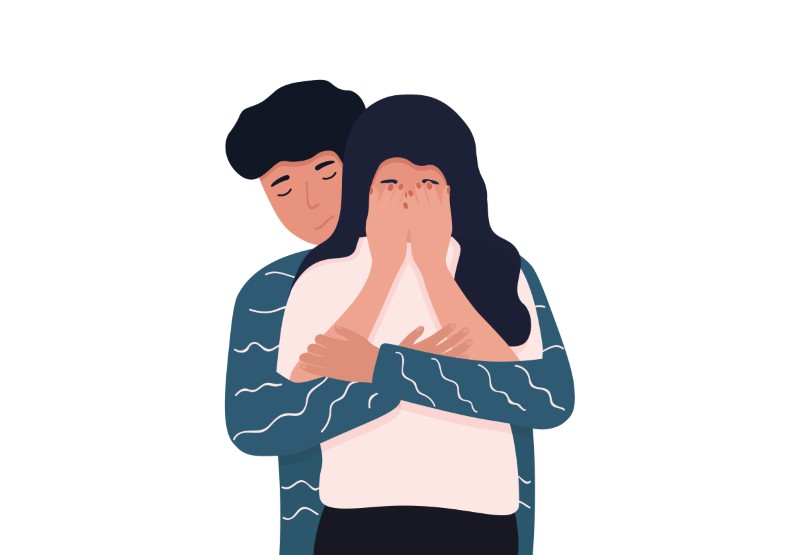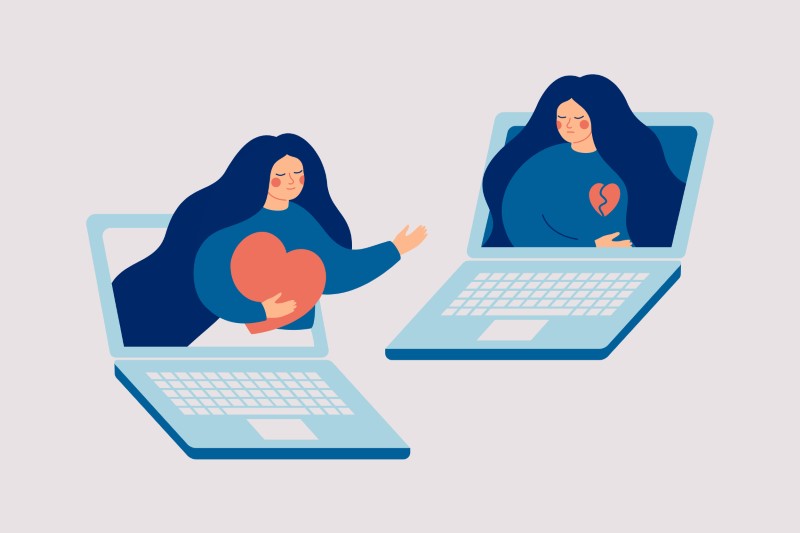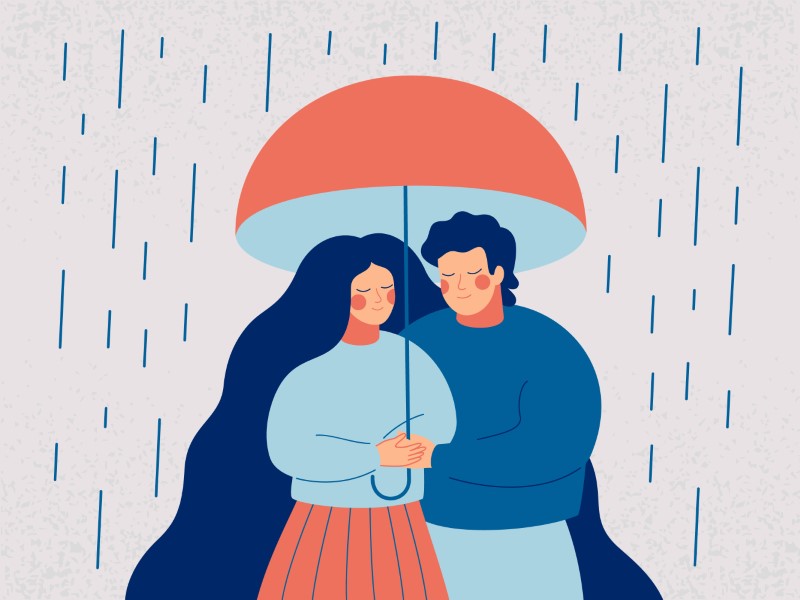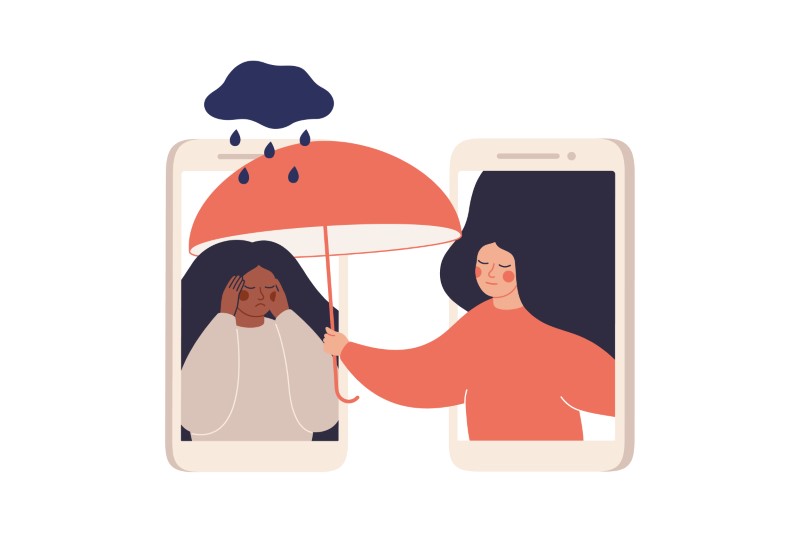With 5% of adults around the world suffering from clinical depression, it’s not uncommon to find yourself dating someone with depression.
Depression can be debilitating for many, and it can also be a challenge for the people dating them. But depression doesn’t have to get in the way of having a healthy and fulfilling relationship.
Just like in all relationships, a relationship with someone who struggles with depression requires thought, care, and balancing each of your individual needs.
And the more you know about depression and what your partner is experiencing, the more prepared you’ll be for any challenges along the way.
What Is Depression?
Depression is more than just sadness or a lack of motivation. Depression is a mental health condition that makes it hard to fully enjoy life. People who struggle with depression often feel empty, numb, lifeless, and low on energy.

Like many other types of mental illness, there are ways to treat depression, but it doesn’t have a permanent cure. For many, depression comes and goes in waves over time.
This means that, if you’re dating someone with depression, it might be safe to expect your partner to have some depressive tendencies or episodes in the future too.
But it’s important to remember that the person you’re dating is defined by much more than their depression and that depression symptoms can be helped.
Signs of Depression
There are several common symptoms of depression, including:
- pervasive negative thoughts
- low energy and/or motivation
- sleeplessness or oversleeping
- sadness, irritability, and/or a feeling of emotional numbness
- a lack of interest in usual hobbies, goals, and activities
- trouble concentrating
- new body aches, pains, and/or fatigue
- hopelessness and/or suicidal ideation
It’s important to note that the signs of depression aren’t the same for everyone. Depression symptoms can range from mild to severe. And some people mask their depression, turning to overworking, using substances, or just faking a smile to hide what they’re actually experiencing.
Causes of Depression
Depression can be caused by a variety of events and factors.
Some causes of depression are external, such as experiencing trauma or past abuse. You might notice the person you’re dating seems to struggle with an insecure attachment style that makes it hard for them to truly feel comfortable in your relationship together.
Negative self-image can also cause or exacerbate depression. If your partner views themselves negatively, they may avoid getting close to others, leading to loneliness and a deeper depression.
But depression can also be caused by internal, biological factors too. Hormones, genes, chronic pain, and even some medications may trigger depression in certain people.
Depression and Dating
Dating someone with depression doesn’t always look the same. Relationships with one or more partners with depression each have their own unique strengths and weaknesses.
But if you’re in a relationship with a depressed person, you may notice certain issues arising in both the early and later stages of your relationship.

Early Relationship Problems
One of the first issues someone might have when dating with depression is avoiding dating in the first place. Depression can discourage some from ever even trying to join dating apps and websites to meet new people.
And even after you’ve met and started dating your depressed partner, they may still feel wary about the relationship. They may fear being rejected or judged by you, especially as you get closer and get to know their mental health struggles better.
Long-Term Relationship Problems
Over time, you may start to notice more patterns or issues forming in the relationship that could be related to depression.
One common issue is to feel at least some degree of disconnection when a partner has a depressive episode. During these episodes, the person with depression is at their lowest, and they often withdraw from the relationship and your typical quality time together.
Your sex life together may also suffer during these times, when libido is likely to take a hit.
Even when you do spend time together, you may feel like they’re physically with you but not mentally or emotionally present.
Because of this, and because of other depression symptoms, some partners also struggle to see the other as positively as they once did. For the depressed partner, everything can start to seem negative and hopeless, including their relationship.
And for the person dating the depressed partner, it can be difficult at times to look past the other partner’s depressive tendencies.
Despite all of this, it is very possible to have a healthy relationship with a depressed partner. With the right approach to helping your partner and yourself, many of the biggest relationship issues related to depression can be managed or avoided altogether.
How to Help a Depressed Partner
If you’re hoping to help the person you’re dating, the good news is that many of the most helpful actions are actually quite simple. You don’t have to have a therapist-level of expertise or knowledge when it comes to depression.
Instead, just learning and offering support can make a huge difference for your partner and your dating life together.

Learn and Ask Questions
First, whether you’re already familiar with depression or not, be open to learning and asking questions.
Not everyone experiences depression the same way, and not every depressed person wants the same kind of support. Offer compassion, stay curious, and ask what would actually help them when they’re feeling down.
Invite, Don’t Demand
When inviting your partner to go out or spend time together, give them the option to decline.
Pressuring someone to do something because you think it will improve their depression symptoms may only make them feel more inadequate if they feel they can’t live up to your expectations.
Keep the Focus on Them
Sometimes, well-intentioned partners and loved ones may use their own feelings and concerns to pressure the other to get help for their depression.
For example, you might want to say, “I’m worried about you. Seeing you down like his makes me feel down too.”
But for the depressed person, this may only make them feel worse and more helpless. They may blame themselves for negatively affecting the people around them, and rather than feeling empowered to make changes, they may feel more like a burden.
Even if you are concerned, keep the focus on them and their experience as much as possible when trying to offer help.
Presence is Powerful
Just being there and being present is often one of the most powerful ways you can help someone with depression. A depressed partner may pull away and isolate themselves. But continue offering your presence and making yourself available.
Even if they say they want to be alone, they may only be saying this to avoid burdening you. Let them know that you’re there for them and they don’t have to deal with their feelings alone.
Encourage Professional Help
If the person you’re dating isn’t already seeing a mental health professional, like a psychotherapist or support groups, encourage them to do so. Offer to help them find a therapist nearby, and ask if you can walk or drive them to their first appointment.
You can also give them the local number for a hotline or organization that can help if they’re hesitant to commit to therapy.
The first steps to getting help can be the hardest, but your support can make all the difference.

Self-Care When Dating a Depressed Partner
Dating someone with depression doesn’t mean you must neglect yourself. In order to maintain a healthy relationship together, you must also have a healthy relationship with yourself.
Self-care, a healthy mindset, and balancing your needs with their’s are essential to making your relationship work.
Date Yourself
If you haven’t started dating yourself yet, now is a great time to start.
Spend time learning about yourself. Get to know your own mental health and emotional needs, and don’t feel guilty for taking time to treat yourself.
You may be spending a lot of time and energy focusing on your partner’s mental health, but remember, your mental health and well-being matter too.
Have a Support System
Having your own friend group and support system outside of the romantic relationship can help keep you grounded during challenging times.
Turn to friends and family who can help you recharge and do fun activities together that your partner may not be up for doing right now.
Remember to respect your partner’s healthy boundaries when it comes to venting, though. While you may want to share your relationship concerns with your friends, it’s also important to not overshare too many private details.
Check Your Expectations
Dating someone with depression can be draining if you don’t have realistic expectations. You may want to take on the role of the savior for your depressed partner, but you can’t fix them or their depression.
Offering love and support does help, but don’t expect it to significantly change their mood or condition. Hoping that your actions will cure them and their depression will only lead to disappointment and frustration.
Don’t Take It Personally
When one partner struggles with depression and the other doesn’t, each person may take these differences personally, leading to fights and arguments.
But their depression and its symptoms aren’t personal. Your significant other may seem uninterested in you and the relationship, but this doesn’t reflect their actual satisfaction or interest in the relationship.
However, depression is never a reason for someone to hurt you or act in abusive ways.
When Should You Break Up With a Depressed Partner?
Many relationships involving someone with depression can function for years and years without ever requiring breaking up.
But there are some instances where it might be better to end the relationship.
First, depression can affect a person’s mood in surprising ways. For some, depression can manifest as anger or frustration. But that is never an excuse for abusive or violent behavior.
Whether your partner is depressed or not, be aware of the signs of toxic relationships and toxic relationship cycles. If you keep cycling through relationship problems, emotional ups and downs, or abusive behavior, it’s better to call it quits.
Some other smaller issues may also be enough to warrant breaking up. One common complaint is that the depressed partner doesn’t have interest in going on dates or spending time together. Then, they may flake on plans last minute.
Set boundaries to honor your own needs in the relationship. For example, ask that your partner not cancel your date plans together right before they’re set to start. Give them the option to cancel ahead of time instead, when you can make plans with other friends if needed.
FAQ on Depression and Dating
Is dating good for depression?
But it’s important to check in with yourself throughout the dating process. Take your time, and don’t rush yourself. If dating seems to trigger more negativity or hopelessness, stop and reassess. You can also discuss your concerns with a therapist.
Can online dating get you depressed?
If online dating is making you question yourself, try a dating site that caters to the type of relationship you want and that doesn’t rely largely on quick swiping.
Can depression make you less attracted to your partner?
Your sex drive may dip, and those butterflies you once had might disappear. If this happens, look to other positive qualities you appreciate about your partner. And experiment with taking some time away from your partner, whether it be for just a day or longer.